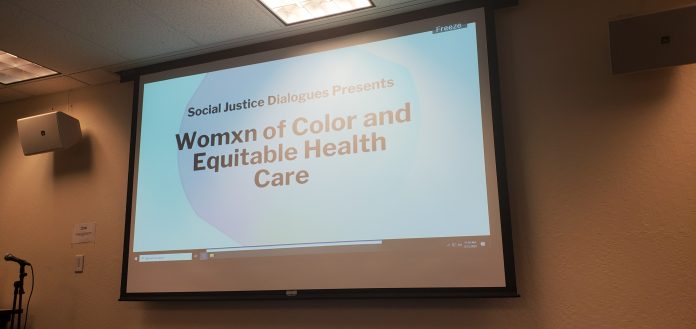This school year’s fifth social justice dialogue, “Womxn of Color and Accessible Health Care,” was held on March 12. The discussion was led by Senior Director of Health and Wellness Services Ana Hernandez and California Rural Legal Assistance advocate, Roselyn Macias, with participants including faculty and students alike. The Social Justice Dialogue series is a collaborative effort between the Otter Cross Culture Center, the Otter Student Union, and the Center for Teaching, Learning and Assessment.
Macias, who holds health workshops for the transgender community, brought her experience with navigating health services as a trans woman. She emphasized the importance of having a doctor who understands where their patient is coming from, to which many could relate. Due to the lack of medical professionals of color, finding practitioners with similar backgrounds can be difficult.
Discussion member and Director for Teaching Learning & Assessment Vivian Waldrup Patterson referenced her own life in suggesting solutions to finding practitioners that work for her. She advocated for building a “circle of care” of medical professionals that are specialized in different areas. Audience members concurred, stressing the prevalence of using word of mouth to seek women and/or people of color in the medical field.
Many also spoke to the issue of not being taken seriously, whether it be with physical or mental health problems. Some told stories of being told they were overreacting at doctor’s visits, leading to misdiagnosis and delayed treatment. Others expressed their struggles with validating absences at work and school due to mental health issues.
Across the board, class lines make healthcare inaccessible. The bias towards white, educated patients leaves others misinformed; one participant told her story of having to learn medical jargon in order to act as a translator to her parents, who don’t speak English. Hernandez mentioned how requiring a doctor’s note favors the wealthy because some cannot afford doctor’s visits.
Those with families who work in agriculture expressed their frustration with getting their parents, often overworked and distrustful of Western medicine, to seek medical assistance. Stigma in the Latinx community specifically can prevent individuals from getting treatment.
“Being Latino, we just don’t want to go to a doctor,” Macias said. “We were brought up with that if you’re going to a therapist, you’re crazy.”
One of the lasting messages of the dialogue was that women of color are their own advocates. Asserting your needs and wants right off the bat is the only way to get the care needed; “This is your opportunity to get comfortable,” Hernandez said.
In regards to what the group wanted from healthcare providers, sensitivity was a must, as well as the ability to adjust and relearn practices for the safety of patients. Beyond being affordable, equitable healthcare would “give access to people you wouldn’t even think of,” Patterson said. In order to achieve accessibility, the intellectual barrier between doctors and patients would have to be broken down.

